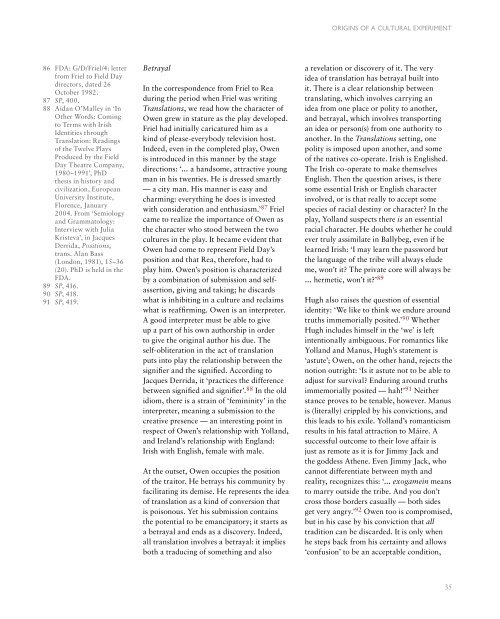cd on translations
cd on translations
cd on translations
Create successful ePaper yourself
Turn your PDF publications into a flip-book with our unique Google optimized e-Paper software.
86 FDA: G/D/Friel/4: letter<br />
from Friel to Field Day<br />
directors, dated 26<br />
October 1982.<br />
87 SP, 400.<br />
88 Aidan O’Malley in ‘In<br />
Other Words: Coming<br />
to Terms with Irish<br />
Identities through<br />
Translati<strong>on</strong>: Readings<br />
of the Twelve Plays<br />
Produced by the Field<br />
Day Theatre Company,<br />
1980–1991’, PhD<br />
thesis in history and<br />
civilizati<strong>on</strong>, European<br />
University Institute,<br />
Florence, January<br />
2004. From ‘Semiology<br />
and Grammatology:<br />
Interview with Julia<br />
Kristeva’, in Jacques<br />
Derrida, Positi<strong>on</strong>s,<br />
trans. Alan Bass<br />
(L<strong>on</strong>d<strong>on</strong>, 1981), 15–36<br />
(20). PhD is held in the<br />
FDA.<br />
89 SP, 416.<br />
90 SP, 418.<br />
91 SP, 419.<br />
Betrayal<br />
In the corresp<strong>on</strong>dence from Friel to Rea<br />
during the period when Friel was writing<br />
Translati<strong>on</strong>s, we read how the character of<br />
Owen grew in stature as the play developed.<br />
Friel had initially caricatured him as a<br />
kind of please-everybody televisi<strong>on</strong> host.<br />
Indeed, even in the completed play, Owen<br />
is introduced in this manner by the stage<br />
directi<strong>on</strong>s: ‘... a handsome, attractive young<br />
man in his twenties. He is dressed smartly<br />
— a city man. His manner is easy and<br />
charming: everything he does is invested<br />
with c<strong>on</strong>siderati<strong>on</strong> and enthusiasm.’ 87 Friel<br />
came to realize the importance of Owen as<br />
the character who stood between the two<br />
cultures in the play. It became evident that<br />
Owen had come to represent Field Day’s<br />
positi<strong>on</strong> and that Rea, therefore, had to<br />
play him. Owen’s positi<strong>on</strong> is characterized<br />
by a combinati<strong>on</strong> of submissi<strong>on</strong> and selfasserti<strong>on</strong>,<br />
giving and taking; he discards<br />
what is inhibiting in a culture and reclaims<br />
what is reaffirming. Owen is an interpreter.<br />
A good interpreter must be able to give<br />
up a part of his own authorship in order<br />
to give the original author his due. The<br />
self-obliterati<strong>on</strong> in the act of translati<strong>on</strong><br />
puts into play the relati<strong>on</strong>ship between the<br />
signifier and the signified. According to<br />
Jacques Derrida, it ‘practices the difference<br />
between signified and signifier’. 88 In the old<br />
idiom, there is a strain of ‘femininity’ in the<br />
interpreter, meaning a submissi<strong>on</strong> to the<br />
creative presence — an interesting point in<br />
respect of Owen’s relati<strong>on</strong>ship with Yolland,<br />
and Ireland’s relati<strong>on</strong>ship with England:<br />
Irish with English, female with male.<br />
At the outset, Owen occupies the positi<strong>on</strong><br />
of the traitor. He betrays his community by<br />
facilitating its demise. He represents the idea<br />
of translati<strong>on</strong> as a kind of c<strong>on</strong>versi<strong>on</strong> that<br />
is pois<strong>on</strong>ous. Yet his submissi<strong>on</strong> c<strong>on</strong>tains<br />
the potential to be emancipatory; it starts as<br />
a betrayal and ends as a discovery. Indeed,<br />
all translati<strong>on</strong> involves a betrayal: it implies<br />
both a traducing of something and also<br />
ORIGINS OF A CULTURAL EXPERIMENT<br />
a revelati<strong>on</strong> or discovery of it. The very<br />
idea of translati<strong>on</strong> has betrayal built into<br />
it. There is a clear relati<strong>on</strong>ship between<br />
translating, which involves carrying an<br />
idea from <strong>on</strong>e place or polity to another,<br />
and betrayal, which involves transporting<br />
an idea or pers<strong>on</strong>(s) from <strong>on</strong>e authority to<br />
another. In the Translati<strong>on</strong>s setting, <strong>on</strong>e<br />
polity is imposed up<strong>on</strong> another, and some<br />
of the natives co-operate. Irish is Englished.<br />
The Irish co-operate to make themselves<br />
English. Then the questi<strong>on</strong> arises, is there<br />
some essential Irish or English character<br />
involved, or is that really to accept some<br />
species of racial destiny or character? In the<br />
play, Yolland suspects there is an essential<br />
racial character. He doubts whether he could<br />
ever truly assimilate in Ballybeg, even if he<br />
learned Irish: ‘I may learn the password but<br />
the language of the tribe will always elude<br />
me, w<strong>on</strong>’t it? The private core will always be<br />
... hermetic, w<strong>on</strong>’t it?’ 89<br />
Hugh also raises the questi<strong>on</strong> of essential<br />
identity: ‘We like to think we endure around<br />
truths immemorially posited.’ 90 Whether<br />
Hugh includes himself in the ‘we’ is left<br />
intenti<strong>on</strong>ally ambiguous. For romantics like<br />
Yolland and Manus, Hugh’s statement is<br />
‘astute’; Owen, <strong>on</strong> the other hand, rejects the<br />
noti<strong>on</strong> outright: ‘Is it astute not to be able to<br />
adjust for survival? Enduring around truths<br />
immemorially posited — hah!’ 91 Neither<br />
stance proves to be tenable, however. Manus<br />
is (literally) crippled by his c<strong>on</strong>victi<strong>on</strong>s, and<br />
this leads to his exile. Yolland’s romanticism<br />
results in his fatal attracti<strong>on</strong> to Máire. A<br />
successful outcome to their love affair is<br />
just as remote as it is for Jimmy Jack and<br />
the goddess Athene. Even Jimmy Jack, who<br />
cannot differentiate between myth and<br />
reality, recognizes this: ‘... exogamein means<br />
to marry outside the tribe. And you d<strong>on</strong>’t<br />
cross those borders casually — both sides<br />
get very angry.’ 92 Owen too is compromised,<br />
but in his case by his c<strong>on</strong>victi<strong>on</strong> that all<br />
traditi<strong>on</strong> can be discarded. It is <strong>on</strong>ly when<br />
he steps back from his certainty and allows<br />
‘c<strong>on</strong>fusi<strong>on</strong>’ to be an acceptable c<strong>on</strong>diti<strong>on</strong>,<br />
35


